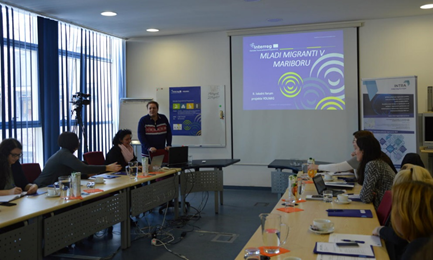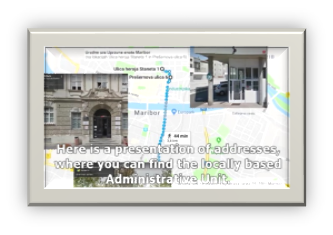YOUMIG - 2nd forum - Youth Migrants in Maribor
29-03-2018
On the 8th of March 2018 the second local forum was organized at the offices of the Maribor Development Agency. The second local forum in Maribor, entitled Youth Migrants in Maribor, brought together the main stakeholders who are dealing with migration issues in Maribor. These were the representatives of the local/regional branches of the national authorities, local authorities, NGOs and migrants themselves.

The forum started off with the presentation of YOUMIG’s information platform, the One-Stop-Shop scheme for young migrants, and the co-working opportunities, both to be implemented during the project’s lifetime. The stakeholders supported both suggestions that will directly contribute to responding to two of the identified main challenges in the local analysis (Local Status Quo Analysis - Maribor) completed at the end of 2017. The aims are to provide information for migrants in brief regarding various administrative issues while setting up a support environment for youth and migrating youth to mitigate the problems arising during the process of setting up one’s own business. Additionally, these activities will also have an impact on improving the knowledge and capacities of staff, working with migrants in the fields of communication and language skills, and improving the attitude of the local population regarding migrants.
The entire event was broadcast by a local TV station, and was published also online. The forum started by the presentation of the Local Status Quo Analysis. The methodology and the process of the paper’s preparation was presented, an discussion turned towards the involvement of all local stakeholders and migrants, which shed light on the challenges within the locality of Maribor. A population projection was also presented, which was the basis for understanding the impact migration has on the demographic development of the city.
Then the eight main areas where further action is needed, as identified in the analysis, were presented to the stakeholders in the room. A clear distinction was made between those problems that can be directly or indirectly influenced by the project’s activities and those which are beyond the scope of the project. The stakeholders agreed on what the presented needs were and that information provision for migrants on administrative issues and the setup of a support environment for youth employment issues were the two needs that can be tackled within the current project.
Additionally, through the implementation of the One-Stop-Shop and the co-working scheme, the following added benefits can be achieved:
- improving staff’s knowledge and capacities while working with migrants in communication and language skills
- improving the attitude of the local population regarding migrants
 Next the One-Stop-Shop for young migrants of the Danube region (OSS) was presented. Under this scheme, a platform will be formed for all the locally relevant stakeholders to exchange and above all provide to-the-point information for migrants. The information will be provided online, and also on the spot at every entry point of the platform (every institution that migrants come in contact with during the required administrative processes). It will be specifically developed for the city of Maribor, allowing a migrant to get support on how to handle the bureaucratic issues, obtain permits, and similar issues.
Next the One-Stop-Shop for young migrants of the Danube region (OSS) was presented. Under this scheme, a platform will be formed for all the locally relevant stakeholders to exchange and above all provide to-the-point information for migrants. The information will be provided online, and also on the spot at every entry point of the platform (every institution that migrants come in contact with during the required administrative processes). It will be specifically developed for the city of Maribor, allowing a migrant to get support on how to handle the bureaucratic issues, obtain permits, and similar issues.
As the last topic of the event the concept of co-working for young migrants of the Danube region was put forward, explaining how the co-working space will be provided for the target group, to offer them entrepreneurial support and also how educational events will be organized for the target group, to empower them for self-employment in Slovenia.
Marjana Rečnik, from the Administrative Unit Maribor – Migration Office, pointed out that her staff is overburdened, but this burden could be reduced by better understanding of what the office’s functions were. Her office is only handling permissions for migrants to enter/stay in Slovenia/Maribor. They are not responsible for driver’s licenses, setting up companies, obtaining VAT ID numbers, or other similar issues. However, as their office is the first contact point migrants have, they often come to them with every request. Therefore, establishing a platform for just explaining the process of how to go about obtaining certain documents would reduce the burden of the Migration Office. For this reason, the Migration Office fully supports the idea of the OSS and would also suggest the inclusion of the Ministry of Foreign Affairs, as that is the body responsible for diplomatic representation. As additional material, an overview of requirements for the special certification of documents (for example documents handled under The Hague Apostille Convention, which abolishes the need to legalise foreign public documents) could be provided, Ms Rečnik concluded.
Marja Guček of the Youth Cultural Centre in Maribor also pointed out that capacity building, for everybody involved in work with migrants, is necessary. Although she realised that this was not something that could be comprehensively achieved through the YOUMIG project, but the formation of a joint platform like the OSS would contribute to the exchange of experiences among actors, which in turn would help capacity building. More importantly, the Coworking programme will help with better integration of migrants into society, which will help mitigate the negative attitudes of the general public towards them.
Nina Marin, from the Employment Services of Slovenia, compared the OSS to the Danube Compass they are involved in developing through another Interreg project, the DRIM project, and was very supportive of the idea of how locally-specific the OSS strives to be. She said that in her view this concept could be transferred to other local communities as well.
Asja Pehar, from the Research Centre of the Slovenian Academy of Sciences and Arts - Slovenian Migration Institute, welcomed the idea of the Coworking programme as a way to empower young migrants, especially as these efforts should also contribute to capacity building, as the field workers who are in touch with migrants do not always possess the knowledge to provide adequate advice.

The overall agreement among the stakeholders was that they are interested and willing to join the OSS as a platform for exchanging experiences among the stakeholders and providing information to migrants. All the attendees are looking forward to the next steps of these activities.
Text by Borut Jurišić, photos by MRA
